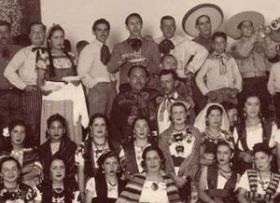How are women and girls treated in Mexico?
Victoria Moate - Close It Fast
 As a US citizen living in Cabo San Lucas, I see that most women are treated well in Mexico. US American women, in my opinion, are raised to be more independent and outspoken than most women in any other country in the world. That being said, I'd say that American women are probably treated a little better simply because they expect and demand it.
As a US citizen living in Cabo San Lucas, I see that most women are treated well in Mexico. US American women, in my opinion, are raised to be more independent and outspoken than most women in any other country in the world. That being said, I'd say that American women are probably treated a little better simply because they expect and demand it. Mexico is a very progressive county and the old attitudes of women staying at home to raise families are...
 As a US citizen living in Cabo San Lucas, I see that most women are treated well in Mexico. US American women, in my opinion, are raised to be more independent and outspoken than most women in any other country in the world. That being said, I'd say that American women are probably treated a little better simply because they expect and demand it.
As a US citizen living in Cabo San Lucas, I see that most women are treated well in Mexico. US American women, in my opinion, are raised to be more independent and outspoken than most women in any other country in the world. That being said, I'd say that American women are probably treated a little better simply because they expect and demand it. Mexico is a very progressive county and the old attitudes of women staying at home to raise families are changing in the more metropolitan cities like Cabo San Lucas. First, dual incomes are becoming a necessity. Second, education opportunities are more readily available to girls here vs. the very rural areas of Mexico. Yet Mexico still has a very conservative history with centuries old traditions.
In Cabo, besides the service industry workforce (house-keeping, child care, food servers retail sales, etc.), we have many local Mexican women selling real estate, going into the medical and legal industries and so much more. For all Mexicans in the Los Cabos area, being bi-lingual is very important.
I see confidence in the younger generation here in Los Cabos. The young women talk of their aspirations and goals of "what they want to be when they grow up." The expat female community is a bit of a curiosity to the Mexican women because our cultural upbringings for the most part, are very different.
As to the expats who are women, they dominate the real estate market as sales agents. Many are retirees. I've never heard of anyone being treated poorly on purpose simply because the person was a woman. I do notice that many of the expats here in Cabo do not strive to speak Spanish, so that does create a communication barrier. But with effort, that is an easy barrier to overcome.
The cultural and economic differences will always be there. Mexico has a reputation for machismo, but as the world changes and Mexico gets more exposure to international living, you will see the Mexican women rise to a different level. It happened in the USA, and it's only a matter of time that is happens in Mexico.
(Couple on ATVs, Cabo San Lucas, Mexico, pictured.)
Posted July 26, 2016
Alicia Gomez - Collins Real Estate

In the past, the women here in Mexico, used to say, “If my husband doesn’t hurt me, he doesn’t love me.” That is really wrong. But that was a long time ago.
Right now, women in Mexico already have the same rights. We work, study, and have the same capacity as men. If a guy tries to hurt me, first of all, I won’t let him but I could hurt him because I am defending myself. I could also call the police and he will...

In the past, the women here in Mexico, used to say, “If my husband doesn’t hurt me, he doesn’t love me.” That is really wrong. But that was a long time ago.
Right now, women in Mexico already have the same rights. We work, study, and have the same capacity as men. If a guy tries to hurt me, first of all, I won’t let him but I could hurt him because I am defending myself. I could also call the police and he will be taken to jail, as hurting women is not allowed anymore.
We have associations that help women who are abused by their husbands. Some of abused women do not say anything and keep it to themselves. Some of them are tired and think they are going to die. Abuse is not only physical but also psychological, which is even worse. Once a woman asks for help, we take them to the association and they undergo therapy. Right now, it’s harder to mistreat a woman in Mexico because most Mexican women now will not agree to being treated in a bad way. They know their rights and are not afraid to exercise their rights.
Posted October 17, 2016
Cathy Rocha
 The neighborhood that I lived in when I first moved to San Miguel de Allende and where I built my first home was a very Mexican working class neighborhood where I was able to observe that women were treated as second-class citizens by their Mexican boyfriends, fathers, or brothers.
The neighborhood that I lived in when I first moved to San Miguel de Allende and where I built my first home was a very Mexican working class neighborhood where I was able to observe that women were treated as second-class citizens by their Mexican boyfriends, fathers, or brothers. As an American and as a feminist, it took a while for me to not react to the way they treat women in Mexico as second-class citizens, in a way where I felt like I needed...
 The neighborhood that I lived in when I first moved to San Miguel de Allende and where I built my first home was a very Mexican working class neighborhood where I was able to observe that women were treated as second-class citizens by their Mexican boyfriends, fathers, or brothers.
The neighborhood that I lived in when I first moved to San Miguel de Allende and where I built my first home was a very Mexican working class neighborhood where I was able to observe that women were treated as second-class citizens by their Mexican boyfriends, fathers, or brothers. As an American and as a feminist, it took a while for me to not react to the way they treat women in Mexico as second-class citizens, in a way where I felt like I needed to do something. I still react to how they treat women in Mexico, but only internally. I’ve learned that it’s not my culture and I can’t change it, so I’ve learned to just walk away from something that I witnessed- unless it’s domestic violence, which is prevalent in this country, then I certainly would have to do something about that.
I have nothing negative to say about how I’ve been treated in Mexico as an expat and as a woman, and I have been involved in building two homes and working with Mexican workers. I’ve been respected, so I have not had a negative experience as an expat woman living in San Miguel de Allende, or as someone traveling in and throughout Mexico.
(Croquet at Rancho Los Labradores, San Miguel de Allende, Mexico, pictured.)
Posted December 2, 2016
David Truly - Dr. David Truly Ph. D.
 Mexico is still in some sense a patriarchal society where men are kind of dominant and machismo is still alive, more so mostly among the lesser educated groups but you can find machismo I still alive in many areas.
Mexico is still in some sense a patriarchal society where men are kind of dominant and machismo is still alive, more so mostly among the lesser educated groups but you can find machismo I still alive in many areas. But at the same time, the role of women in society and in the economy is important than ever before. More women are going to college than ever before. More women are working. One sees among the younger generation more of a typical American...
 Mexico is still in some sense a patriarchal society where men are kind of dominant and machismo is still alive, more so mostly among the lesser educated groups but you can find machismo I still alive in many areas.
Mexico is still in some sense a patriarchal society where men are kind of dominant and machismo is still alive, more so mostly among the lesser educated groups but you can find machismo I still alive in many areas. But at the same time, the role of women in society and in the economy is important than ever before. More women are going to college than ever before. More women are working. One sees among the younger generation more of a typical American or more modern woman than the traditional image of Mexican women.
With that said, women and girls are generally treated with a great deal of respect. Mexican society, whether it’s men or women, is very fastidious with their pleasantries: “buenos dias” and hugs and kisses on the cheek. In that sense it certainly looks and feels like much more of a gentile society than you’ll find in the United States, generally speaking.
However, women in general and single women particularly, need to be careful sometimes in certain situations. I think it’s also important to realize that, for some men in some areas, this machismo, or kind of patriarchal control and dominance is still there. Foreign women in particular need to be a little careful sometimes on how they speak towards more macho men. Sometimes foreign women can upset them, which you do not want to do.
(Expats enjoying a Halloween performance with the David Truly's band, The Tall Boys, Mexico, pictured.)
Posted February 5, 2017
Iona Chamberlin - Hacienda San Pedro Nohpat
 As a woman, I’ve always been treated with a great deal of respect in Mexico. The Mexicans just definitely describe the society here as macho, but I’ve never really talked to anybody about that. Many people would say that women and children are treated with a great deal of respect, but some people might say that women are disrespected. But I’ve seen more women who are disrespected in Canada than I’ve ever seen women who are disrespected in Mexico. I’ve...
As a woman, I’ve always been treated with a great deal of respect in Mexico. The Mexicans just definitely describe the society here as macho, but I’ve never really talked to anybody about that. Many people would say that women and children are treated with a great deal of respect, but some people might say that women are disrespected. But I’ve seen more women who are disrespected in Canada than I’ve ever seen women who are disrespected in Mexico. I’ve... As a woman, I’ve always been treated with a great deal of respect in Mexico. The Mexicans just definitely describe the society here as macho, but I’ve never really talked to anybody about that. Many people would say that women and children are treated with a great deal of respect, but some people might say that women are disrespected. But I’ve seen more women who are disrespected in Canada than I’ve ever seen women who are disrespected in Mexico. I’ve never had any problem with how the people in Mexico treat me.
As a woman, I’ve always been treated with a great deal of respect in Mexico. The Mexicans just definitely describe the society here as macho, but I’ve never really talked to anybody about that. Many people would say that women and children are treated with a great deal of respect, but some people might say that women are disrespected. But I’ve seen more women who are disrespected in Canada than I’ve ever seen women who are disrespected in Mexico. I’ve never had any problem with how the people in Mexico treat me. My husband and I run a hacienda near Merida, in the state of Yucatan, with people working for us, and they always do what they’re asked, unless you tell them all the time what they have to do, in which case they just won’t do anything. For every employee, it’s a half an hour out of your day just giving them direction and checking on their work.
(Iona Chamberlain with the son of Tere Duran, one of her staff, Hacienda Nohpat San Pedro, near Merida, Mexico, pictured.)
Posted March 10, 2017
Valerie Friesen - Blue Angel Solutions
 As a woman expat in Mexico, I don't notice a huge difference in how I'm treated in Mexico compared to how my Canadian husband treats me, although there is some lingering Mexican machismo here in Mexico.
As a woman expat in Mexico, I don't notice a huge difference in how I'm treated in Mexico compared to how my Canadian husband treats me, although there is some lingering Mexican machismo here in Mexico. I've been really impressed with how involved the younger Mexican men are with their family and children. They may be exceptions from the general male Mexican population, but if you're out at 8...
 As a woman expat in Mexico, I don't notice a huge difference in how I'm treated in Mexico compared to how my Canadian husband treats me, although there is some lingering Mexican machismo here in Mexico.
As a woman expat in Mexico, I don't notice a huge difference in how I'm treated in Mexico compared to how my Canadian husband treats me, although there is some lingering Mexican machismo here in Mexico. I've been really impressed with how involved the younger Mexican men are with their family and children. They may be exceptions from the general male Mexican population, but if you're out at 8 o'clock in the morning, it's not uncommon to see both men and women taking their children by the hand and walking them to school.
As a woman who has been doing business in Mexico for more than eight years, I don't find it more difficult to do business as a woman than how it would be for a man. The treatment you send out to Mexican locals is the treatment that you get back. I haven't had any problems doing business in Mexico.
(Extended Mexican family, pictured.)
Posted June 21, 2017
Cathie Smith LoCicero - Cathie Smith Insurance
 Women and girls are treated extremely respectfully in Mexico. The locals always call me "señora" (madam). The respectful way to address an older lady in Mexico is "doña" (older woman of rank). Even though I'm in that age group, I prefer to be called "señora" because I'm hoping that people don't consider me that old, and they do.
Women and girls are treated extremely respectfully in Mexico. The locals always call me "señora" (madam). The respectful way to address an older lady in Mexico is "doña" (older woman of rank). Even though I'm in that age group, I prefer to be called "señora" because I'm hoping that people don't consider me that old, and they do. If the locals are speaking Spanish to you, they always use the formal...
 Women and girls are treated extremely respectfully in Mexico. The locals always call me "señora" (madam). The respectful way to address an older lady in Mexico is "doña" (older woman of rank). Even though I'm in that age group, I prefer to be called "señora" because I'm hoping that people don't consider me that old, and they do.
Women and girls are treated extremely respectfully in Mexico. The locals always call me "señora" (madam). The respectful way to address an older lady in Mexico is "doña" (older woman of rank). Even though I'm in that age group, I prefer to be called "señora" because I'm hoping that people don't consider me that old, and they do. If the locals are speaking Spanish to you, they always use the formal Spanish instead of the familiar Spanish.
The girls are also very much respected in Mexico. I was talking to a woman the other day who said that when she went to Italy to study, she was surprised that the Italian men would pinch her rear end. I said, "Yes, I've heard of that. I don't know if they still do that, but I've heard that the gesture was a sign of respect in Italy." They would never touch a girl in Mexico. They just do not.
I formed an alliance group here in Cabo San Lucas. My significant other there was a retired Mexican military officer. One of my male American friends took him aside and told him when we were at a dinner, "Please, you're making all of us look bad because if Cathie has to go to the restroom, you stand up and hold her chair. When she comes back, you stand up and hold her chair again. All of our wives are mad at us because we're not doing that." I thought that was pretty funny.
The Mexican people respect everyone, even the women and the girls. It's very old fashioned in Mexico. To me, it's like going back in time.
(Senora Cathie LoCiero, pictured.)
Posted July 10, 2017
Yolanda Martinez
 How women and girls are treated in Mexico depends on what state in which you’re living. In my opinion, in Mexico we still have a lot of chivalry even though as women, we are fighting to be in the workforce and to be empowered. We are starting to have higher paying, great jobs in professional fields. In many political positions and judicial positions, they prefer a woman because we tend to be more organized. We are treated very well here.
How women and girls are treated in Mexico depends on what state in which you’re living. In my opinion, in Mexico we still have a lot of chivalry even though as women, we are fighting to be in the workforce and to be empowered. We are starting to have higher paying, great jobs in professional fields. In many political positions and judicial positions, they prefer a woman because we tend to be more organized. We are treated very well here. ...
 How women and girls are treated in Mexico depends on what state in which you’re living. In my opinion, in Mexico we still have a lot of chivalry even though as women, we are fighting to be in the workforce and to be empowered. We are starting to have higher paying, great jobs in professional fields. In many political positions and judicial positions, they prefer a woman because we tend to be more organized. We are treated very well here.
How women and girls are treated in Mexico depends on what state in which you’re living. In my opinion, in Mexico we still have a lot of chivalry even though as women, we are fighting to be in the workforce and to be empowered. We are starting to have higher paying, great jobs in professional fields. In many political positions and judicial positions, they prefer a woman because we tend to be more organized. We are treated very well here. Women in Mexico have more rights than in many other countries. We even have more rights in some sense than a man does. For example, we even have a section in our Penal Code that is called femicide for homicides against women. So, we are protected in that scary sense but in general, we are treated wonderfully.
The Mexican culture has a very, very romantic way of treating women, extending from even the dating and courting of women to taking to them in Mariachi, which is our traditional music. By taking a woman flowers at night and singing they show they are falling in love with them and waking them up. We’re a very romantic country in that sense and especially, in this area.
There are differences how women and girls are treated in different parts of the country. In my opinion, Mexico is a country that is so diverse that you cannot compare Lake Chapala even to Guadalajara, which is the state capital of Jalisco, or compare it to Mexico City or to San Miguel de Allende or even to Tulum. Doing so is sometimes comparing apples and oranges. So, with that being stated, the day-to-day experiences for a woman in Mexico, depending on the field of work, is somewhat like the experience in the United States.
Nowadays, most women are working in diverse fields. Women nowadays are very influential and very powerful. Even though the situation in Mexico is like the US, we’re not as advanced as high profiled corporate American women who have the full-time nannies but there are a few of us out there that do have that type of help because we are full time worker bees.
(Dr. Luz, optometrist working out of the Lake Chapala Society, Ajijic, Mexico, pictured.)
Posted August 2, 2017



.png)